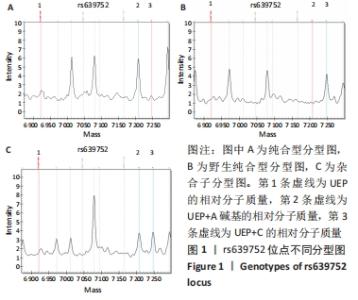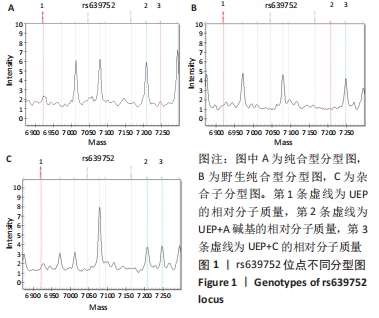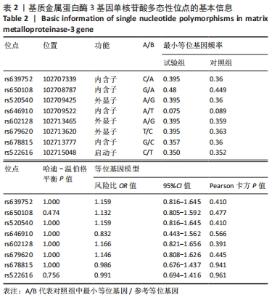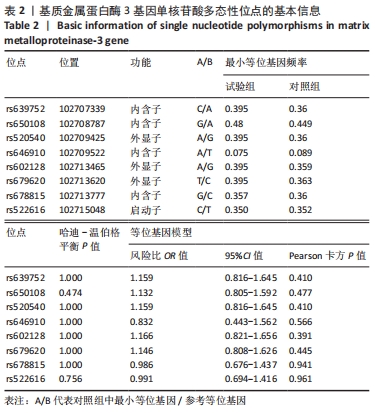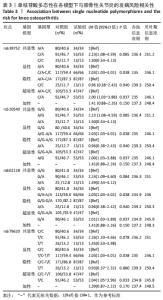[1] SHOWERY JE, KUSNEZOV NA, DUNN JC, et al. The Rising Incidence of Degenerative and Posttraumatic Osteoarthritis of the Knee in the United States Military. J Arthroplasty. 2016;31(10):2108-2114.
[2] 吕苏梅,张瑞丽.中老年膝骨关节炎的流行病学研究进展[J].中国老年学,2016,36(16):4133-4135.
[3] YANG Y, WANG Y, WANG Y, et al. Tormentic Acid Inhibits IL-1β-Induced Inflammatory Response in Human Osteoarthritic Chondrocytes. Inflammation. 2016;(3):1-9.
[4] NEUNABER C, WYPIOR H, WESTPHAL R, et al. Repetitive reduction lead to significant elevated IL-6 and decreased IL-10 levels in femoral osteotomies: a quantitative analysis of a robot-assisted reduction process in a rat model. Injury. 2016;47(8):1669-1675.
[5] LIU Y, HAO P, ZHAO M, et al. Correlation of IL-17 Level in Synovia and Severity of Knee Osteoarthritis. Med Sci Monit. 2015;21:1732-1736.
[6] 刘扬.白细胞介素-24基因在膝关节骨性关节炎发病中的作用及意义[J].中国现代医学杂志,2016,26(13):63-67.
[7] TAO K, REY-RICO A, FRISCH J, et al. rAAV-mediated combined gene transfer and overexpression of TGF-β and SOX9 remodels human osteoarthritic articular cartilage. J Orthop Res. 2016;24:S397-S398.
[8] DONG J, HAO Z, FAN D, et al. Association between GDF5 +104T/C polymorphism and knee osteoarthritis in Caucasian and Asian populations: a meta-analysis based on case-control studies. J Orthop Surg Res. 2016;11(1):104.
[9] SHAH SS, MITHOEFER K. Current Applications of Growth Factors for Knee Cartilage Repair and Osteoarthritis Treatment . Curr Rev Musculoskelet Med. 2020;13(6):641-650.
[10] XING D, MA XL, MA JX, et al. Association between aspartic acid repeat polymorphism of the asporin gene and susceptibility to knee osteoarthritis: a genetic meta-analysis. Osteoarthritis Cartilage. 2013;21(11):1700-1706.
[11] KOSKINEN A, VUOLTEENAHO K, NIEMINEN R, et al. Leptin enhances MMP-1, MMP-3 and MMP-13 production in human osteoarthritic cartilage and correlates with MMP-1 and MMP-3 in synovial fluid from OA patients. Clin. Exp. Rheumatol. 2011;29(1):57-64.
[12] BERGINK AP, VAN MEURS JB, LOUGHLIN J, et al. Estrogen receptor alpha gene haplotype is associated with radiographic osteoarthritis of the knee in elderly men and women. Arthritis Rheum. 2003;48(7):1913-1922.
[13] 祁雷,姚运峰,荆珏华.基质金属蛋白酶抑制剂在骨关节炎治疗中应用的研究进展[J].齐鲁医学杂志,2017,32(1):111-113.
[14] BJÖRN PASTERNAK PA. Metalloproteinases and their inhibitors—diagnostic and therapeutic opportunities in orthopedics. Acta Orthop. 2009;80(6): 693-703.
[15] KAPOOR M, MARTELPELLETIER J, LAJEUNESSE D, et al. Role of proinflammatory cytokines in the pathophysiology of osteoarthritis. Nat Rev Rheumatol. 2011;7(1):33.
[16] 李守龙,艾依热提·买买提,潘海涛,曾峥.膝骨关节炎滑膜不同部位基质金属蛋白酶3的表达及临床意义[J].首都医科大学学报,2013, 34(3):411-415.
[17] 贺占坤, 沈杰威. MMP-2、MMP-3、MMP-9和TIMP-1评价膝关节骨性关节炎的临床研究[J].重庆医学,2013(32):3872-3874.
[18] 王维山,董金波,何斌,等.OA患者血液及关节液中MMP-3、uPA水平检测及临床意义[J].山东医药,2011,51(3):63-64.
[19] HONSAWEK S, MALILA S, YUKTANANDANA P, et al. Association of MMP-3 (-1612 5A/6A) polymorphism with knee osteoarthritis in Thai population. Rheumatol Int. 2013;33(2):435-439.
[20] ABD-ALLAH SH, SHALABY SM, PASHA HF, et al. Variation of matrix metalloproteinase 1 and 3 haplotypes and their serum levels in patients with rheumatoid arthritis and osteoarthritis. Genet Test Mol Biomarkers. 2012;16(1):15-20.
[21] MATTEY DL, NIXON NB, DAWES PT, et al. Association of matrix metalloproteinase 3 promoter genotype with disease outcome in rheumatoid arthritis. Genes Immun. 2004;5(2):147-149.
[22] HAYAMI T, PICKARSKI M, WESOLOWSKI GA, et al. The role of subchondral bone remodeling in osteoarthritis: reduction of cartilage degeneration and prevention of osteophyte formation by alendronate in the rat anterior cruciate ligament transection model. Arthritis Rheum. 2004;50(4):1193-1206.
[23] MENEZESSILVA R, KHALIQ S, DEELEY K, et al. Genetic Susceptibility to Periapical Disease: Conditional Contribution of MMP2 and MMP3 Genes to the Development of Periapical Lesions and Healing Response. J Endod. 2012;38(5):604-607.
[24] LETRA A, SILVA RM, RYLANDS RJ, et al. MMP3 and TIMP1 variants contribute to chronic periodontitis and may be implicated in disease progression. J Clin Periodontol. 2012;39(8):707-716.
[25] CUGINO D, GIANFAGNA F, AHRENS W, et al. Polymorphisms of matrix metalloproteinase gene and adiposity indices in European children: results of the IDEFICS study. Int J Obes. 2013;37(12):1539-1544.
[26] FOSTER BP, MORSE CI, ONAMBELE GL, et al. Variants within the MMP3 gene and patellar tendon properties in vivo in an asymptomatic population. Eur J Appl Physiol. 2014;114(12):2625-2634.
[27] RALEIGH SM, VAN DML, RIBBANS WJ, et al. Variants within the MMP3 gene are associated with Achilles tendinopathy: possible interaction with the COL5A1 gene. Br J Sports Med. 2009;43(7):514-520.
|
